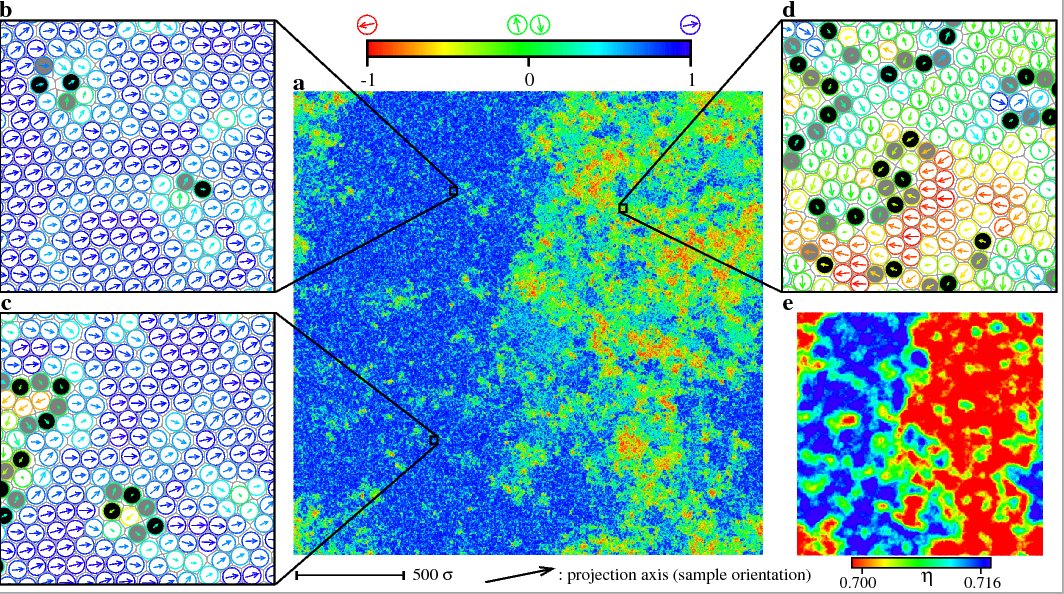Main Page
From Werner KRAUTH
| Revision as of 22:15, 27 November 2011 Werner (Talk | contribs) (→Current research) ← Previous diff |
Revision as of 18:44, 30 November 2011 Werner (Talk | contribs) (→Current research) Next diff → |
||
| Line 19: | Line 19: | ||
| my work is in collaboration with colleagues and students. | my work is in collaboration with colleagues and students. | ||
| + | ==Event-driven Monte Carlo algorithm for general potentials | ||
| + | In construction. | ||
| + | |||
| + | ==Two-dimensional melting: First-order liquid-hexatic transition | ||
| [[Image:Phase separation sample.jpg|left|50px]] Here, I show the key figure of [[Bernard_Krauth_2011| a recent paper]], with Etienne Bernard, on the metlting transition in hard disks. The main picture shows the orientations of a configuration with 1024x1024 disks, and two different regions are clearly visible: To the left, disks have more or less the same orientation, whereas to the right, the orientations vary (and the local densities are lower). To produce the picture, we used the | [[Image:Phase separation sample.jpg|left|50px]] Here, I show the key figure of [[Bernard_Krauth_2011| a recent paper]], with Etienne Bernard, on the metlting transition in hard disks. The main picture shows the orientations of a configuration with 1024x1024 disks, and two different regions are clearly visible: To the left, disks have more or less the same orientation, whereas to the right, the orientations vary (and the local densities are lower). To produce the picture, we used the | ||
| [[Bernard_Krauth_Wilson_2009|event-chain algorithm]], a new Monte Carlo method that we developed a few years ago, with David Wilson. This algorithm is really the first one to outperform the classic Metropolis method from 1953. For a long time, I have been interested in the hard-disk melting problem, but an earlier attempt to speed up the extremely slow converge of numerical methods for this problem, [[Dress_Krauth_1995| the cluster algorithm that I developed with C. Dress]], had failed. | [[Bernard_Krauth_Wilson_2009|event-chain algorithm]], a new Monte Carlo method that we developed a few years ago, with David Wilson. This algorithm is really the first one to outperform the classic Metropolis method from 1953. For a long time, I have been interested in the hard-disk melting problem, but an earlier attempt to speed up the extremely slow converge of numerical methods for this problem, [[Dress_Krauth_1995| the cluster algorithm that I developed with C. Dress]], had failed. | ||
Revision as of 18:44, 30 November 2011
Welcome to my new webpage (construction area)
Contents |
Upcoming events
Summerschool: First Les Houches school in computational physics: soft matter June 20, 2011 - July 1, 2011, Les Houches, France
Workshop: PyPhy - Python in Physics 2011, August 29, 2011, ENS, Paris
Satellite meeting of the 4th European Meeting of Python in Science (Euroscipy 2011) also taking place at August 25-28, 2011, ENS, Paris
Current research
I am deeply interested in statistical physics and condensed matter physics, often in connection to computation and algorithms. Current interests are in hard spheres, mainly the melting transition in two-dimensional disks, bosons (in collaboration with the experimental groups at ENS), and the theory of convergence and of coupling in Markov chains. Practically all my work is in collaboration with colleagues and students.
==Event-driven Monte Carlo algorithm for general potentials In construction.
==Two-dimensional melting: First-order liquid-hexatic transition
Here, I show the key figure of a recent paper, with Etienne Bernard, on the metlting transition in hard disks. The main picture shows the orientations of a configuration with 1024x1024 disks, and two different regions are clearly visible: To the left, disks have more or less the same orientation, whereas to the right, the orientations vary (and the local densities are lower). To produce the picture, we used theevent-chain algorithm, a new Monte Carlo method that we developed a few years ago, with David Wilson. This algorithm is really the first one to outperform the classic Metropolis method from 1953. For a long time, I have been interested in the hard-disk melting problem, but an earlier attempt to speed up the extremely slow converge of numerical methods for this problem, the cluster algorithm that I developed with C. Dress, had failed.
Text book

A picture book of research




Research areas
Address
Werner Krauth Laboratoire de Physique Statistique École normale supérieure 24 rue Lhomond 75231 Paris Cedex 05 France Tel +33 (0) 44 32 25 50


